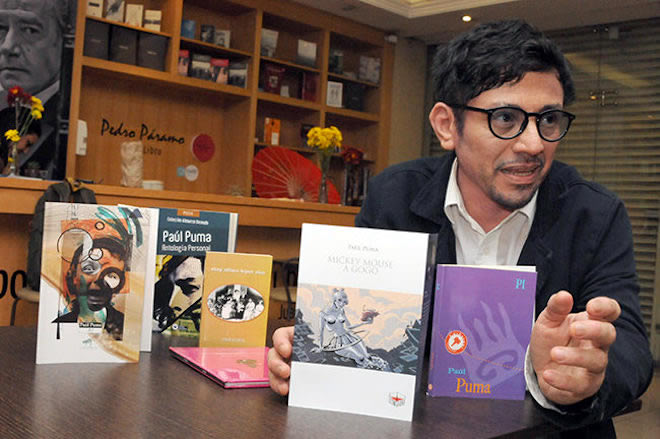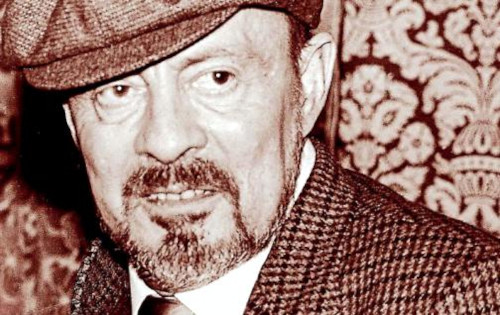Néstor Campuzano Mendoza (Guayaquil, February 7, 1926 – Unknown) was an Ecuadorian poet and intellectual best known for writing the lyrics to the anthem of Universidad Laica Vicente Rocafuerte. His literary career, marked by a deep sensitivity and mastery of sonnets, earned him notable recognition, including the ‘Estrella de Octubre’ award in 1956 for his Soneto a Cristo. His works, such as Horas Milagrosas, Trigal Azul, and Elegía del Ayer, reflect a melancholic and philosophical outlook on life. He is remembered as a revered figure in Ecuadorian literature for his contributions to poetry and cultural heritage.
Early Life and Education
Néstor Campuzano Mendoza was born on February 7, 1926, in Guayaquil, Ecuador, to Jacinto Campuzano Castro and Rita Mendoza Mejía de Campuzano. He grew up in a humble environment, experiencing poverty that deeply influenced his worldview and creative output. His early years were marked by financial limitations, which led him to improvise toys and find joy in simplicity. Despite these challenges, his upbringing was filled with love and care, particularly from his mother, to whom he later dedicated sonnets reflecting her tenderness and devotion.
Campuzano’s connection to his roots and the difficulties he faced as a child played a significant role in shaping his sensitivity, both as a person and as a poet. Although details about his formal education are sparse, his intellectual development is evident in his mastery of poetic form, particularly the sonnet.
Literary Career
Néstor Campuzano Mendoza began his poetic career by experimenting with free verse before mastering the complex structure of the sonnet, a form that allowed him to express profound philosophical ideas and emotional depth. His first published poems appeared in El Filántropo, and over time, he gained recognition for his ability to convey deep melancholia and sensitivity through his poetry.
One of his most significant literary achievements came in 1956 when he won the prestigious “Estrella de Octubre” award for his poem Soneto a Cristo at the Juegos Florales de Guayaquil. This victory was notable because he competed against esteemed poets like Juana de Ibarbourou from Uruguay and Demetrio Korsi, further establishing his prominence within the Ecuadorian literary community.
Campuzano’s most recognized works include Horas Milagrosas, Trigal Azul, and Elegía del Ayer. These collections, particularly Elegía del Ayer, published by Universidad Laica Vicente Rocafuerte in 1982, showcase his melancholic reflection on life, memory, and existential themes. His poetry was also featured in anthologies such as Poesía de tres generaciones (1967), which highlighted Ecuadorian poets of various generations and celebrated the legacy of Rubén Darío.
Connection to Universidad Laica Vicente Rocafuerte
In addition to his literary works, Néstor Campuzano Mendoza is best known for writing the lyrics to the anthem of Universidad Laica Vicente Rocafuerte, a university in Guayaquil that embodies the values of secular education, intellectual freedom, and personal growth. The anthem, infused with Campuzano’s poetic spirit, reflects the aspirations of the university and its dedication to enlightenment and knowledge.
His association with the university extended beyond the hymn; he was considered a respected member of the institution, and his contributions to its cultural and intellectual environment were deeply appreciated. Although the university could not fulfill all of his personal needs due to financial limitations, it recognized his literary significance and continued to honor his work.
Personal Life and Challenges
Despite his intellectual and literary accomplishments, Campuzano lived modestly. His struggles with poverty paralleled those of literary figures like Cervantes and Bécquer, both of whom also dignified hardship through their work. Although he received accolades, his achievements did not translate into material wealth, and he remained humble throughout his life.
In 1979, the Circle of Journalists of Guayas initiated efforts to secure land for Campuzano to build a home. However, this initiative faltered due to the death of Ecuadorian President Jaime Roldós, leaving the plan incomplete. Campuzano continued to live in modest conditions, and while he was not financially prosperous, he was spiritually and intellectually rich.
Legacy and Recognitions
Néstor Campuzano Mendoza is revered as a significant figure in Ecuadorian and Hispanic literature. His poetry, deeply philosophical and emotionally charged, has left an indelible mark on Ecuadorian cultural heritage. The Universidad Laica Vicente Rocafuerte continues to honor him, and his work remains a vital part of the country’s poetic tradition.
Campuzano’s contributions to Ecuadorian poetry are further acknowledged in anthologies and literary circles, where he is celebrated for his unique voice and his ability to transform personal and collective struggles into powerful artistic expression. His legacy as a poet of integrity, humility, and profound insight endures, both in Ecuador and throughout the broader Spanish-speaking world.
Selected Works
- Horas Milagrosas (1969)
- Trigal Azul
- Elegía del Ayer (1982)
Anthologies included in:
- Poesía de tres generaciones (1967, Casa de la Cultura Ecuatoriana Benjamín Carrión. Núcleo del Guayas. Sección Literatura)
- Cantos a Guayaquil by Germán Arteta Vargas (2011, Offset Graba)
References
- Alexandra Tamayo’s Blog, “Néstor Campuzano Mendoza, autor de la letra del himno de la Universidad Laica Vicente Rocafuerte,” speech by Dra. Lida Mieles de Aguilar at the 17th Anniversary of Universidad Laica Vicente Rocafuerte. Retrieved on October 22, 2024. Click to view.
- Biblioteca y Archivo de la Casa de la Cultura Ecuatoriana, “Poesía de tres generaciones (ciclo de recitales en homenaje al poeta Rubén Darío).” Retrieved on October 22, 2024. Click to view.
- Google Books, “Las horas milagrosas.” Retrieved on October 22, 2024. Click to view.
- Biblioteca de Pontificia Universidad Católica del Ecuador, “Elegía del Ayer.” Retrieved on October 22, 2024. Click to view.

